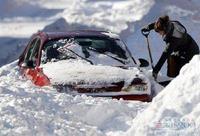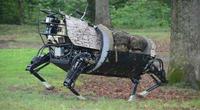-
Neuroscience study reveals new link between basic math skills and PSAT math success
New research provides brain imaging evidence that students well-versed in very basic single digit arithmetic (5+2=7 or 7-3=4) are better equipped to score higher on the Preliminary Scholastic Aptitude Test (PSAT), an examination sat by millions of students in the United States each year in preparation for college admission tests
-
-
Smartphones turned into secure and versatile keys
It is already possible to open doors using an app — but we are a long way from seeing widespread acceptance of this in the market; now, researchers have developed a piece of software that will make the technology even more secure and versatile
-
-
Political action the biggest swing factor in meeting climate targets: study
The new study examines the probability of keeping average global temperatures from rising more than 2°C above preindustrial levels under varying levels of climate policy stringency, and thus mitigation costs
-
-
Flexible electronics to make night vision more accurate, easier to use
For soldiers and first responders, having accurate, high-resolution imaging capabilities may mean the difference between success and failure; electrical and computer engineers set out to make night vision more accurate and easier for soldiers, pilots, and first responders to use
-
-
Flexible electronics to make night vision more accurate, easier to use
For soldiers and first responders, having accurate, high-resolution imaging capabilities may mean the difference between success and failure; electrical and computer engineers set out to make night vision more accurate and easier for soldiers, pilots, and first responders to use
-
-
The natural relationship between CO2 concentrations and sea level means that sea level will continue to rise
By comparing reconstructions of atmospheric CO2 concentrations and sea level over the past forty million years, researchers have found that greenhouse gas concentrations similar to the present (almost 400 parts per million) were systematically associated with sea levels at least nine meters above current levels
-
-
Less-lethal 12-gauge shotgun round for law enforcement unveiled
Innovative new round flattens, or “pancakes,” across a subject’s body on impact rather than keeping its shape as other rounds do
-
-
Broader background checks, denial criteria may help prevent mass-shooting catastrophes
Garen Wintemute, a leading authority on gun violence prevention and an emergency medicine physician at the University of California, Davis, believes broader criteria for background checks and denials on gun purchases can help prevent future firearm violence, including mass shooting catastrophes such as those that occurred at Sandy Hook, Aurora, Virginia Tech, and Columbine
-
-
The burden of disease links ecology to economic development and growth
According to conventional economic wisdom, the foundation of economic growth is in political and economic institutions; researchers argue that, in fact, vector-borne and parasitic diseases have substantial effects on economic development across the globe, and that these diseases are major drivers of differences in income between tropical and temperate countries; the burden of these diseases is, in turn, determined by underlying ecological factors: it is predicted to rise as biodiversity falls
-
-
Texas drought helps in demonstrating viability of drought-tolerant corn
There is nothing like a couple years of drought to help determine the advances being made in drought-tolerant corn, and the historic drought in Texas in 2011 and in the Corn Belt in 2012 helped Texas A&M scientists show that different types of drought-tolerant corn performed well with far lower levels of irrigation
-
-
Winter storm hits Midwest, heading toward Northeast

A powerful winter storm system hit the U.S. Midwest Wednesday, heading toward the states of the Northeast, where high winds and heavy snow have disrupted holiday travel, left tens of thousands without power, and were blamed in at least six deaths
-
-
Four-legged robotic mule now voice-controlled

DARPA researchers demonstrated new advances in the Legged Squad Support System (LS3) four-legged robot’s control, stability, and maneuverability, including “Leader Follow” decision making, enhanced roll recovery, exact foot placement over rough terrain, the ability to maneuver in an urban environment, and verbal command capability
-
-
New approach to science education: bite-size YouTube mini-lessons
A university of Michigan professor created a cheeky, perhaps even quirky, series of mini-lessons posted on YouTube; the series takes interesting facts about risk science — defined as the science of existing and emerging human health risks — and presents them in small, relatable, and easily digestible video segments to help answer the question, “Just how risky is this?”
-
-
Downloadable, printable gun technology may change gun-ownership landscape
An Austin, Texas-based Defense Distributed says its mission is to create the WikiWeapon: a downloadable Internet file which will allow users to print their gun on a 3D printer; when the development process is complete, “any person has near-instant access to a firearm through the Internet,” the company says;the company adds: “This project might change the way we think about gun control and consumption. How do governments behave if they must one day operate on the assumption that any and every citizen has near instant access to a firearm through the Internet? Let’s find out”
-
-
Potentially devastating asteroid collision in 2040 not likely to happen
A team of astronomers from the University of Hawaii’s Institute for Astronomy (IfA) have confirmed that the chance of asteroid 2011 AG5 impacting Earth in 2040 is no longer a significant risk — prompting a collective sigh-of-relief; previously, scientists estimated that the risk of this 140-meter-diameter (about the length of two American football fields) asteroid colliding with the Earth – and releasing about 100 megatons of energy — was as high as one in 500
-
More headlines
The long view
New Technology is Keeping the Skies Safe
DHS S&T Baggage, Cargo, and People Screening (BCP) Program develops state-of-the-art screening solutions to help secure airspace, communities, and borders
Factories First: Winning the Drone War Before It Starts
Wars are won by factories before they are won on the battlefield,Martin C. Feldmann writes, noting that the United States lacks the manufacturing depth for the coming drone age. Rectifying this situation “will take far more than procurement tweaks,” Feldmann writes. “It demands a national-level, wartime-scale industrial mobilization.”
How Artificial General Intelligence Could Affect the Rise and Fall of Nations
Visions for potential AGI futures: A new report from RAND aims to stimulate thinking among policymakers about possible impacts of the development of artificial general intelligence (AGI) on geopolitics and the world order.
Smaller Nuclear Reactors Spark Renewed Interest in a Once-Shunned Energy Source
In the past two years, half the states have taken action to promote nuclear power, from creating nuclear task forces to integrating nuclear into long-term energy plans.
Keeping the Lights on with Nuclear Waste: Radiochemistry Transforms Nuclear Waste into Strategic Materials
How UNLV radiochemistry is pioneering the future of energy in the Southwest by salvaging strategic materials from nuclear dumps –and making it safe.
Model Predicts Long-Term Effects of Nuclear Waste on Underground Disposal Systems
The simulations matched results from an underground lab experiment in Switzerland, suggesting modeling could be used to validate the safety of nuclear disposal sites.
